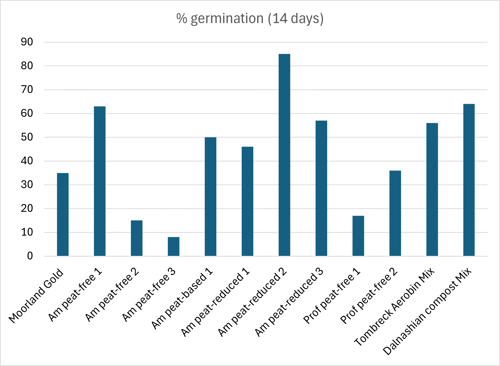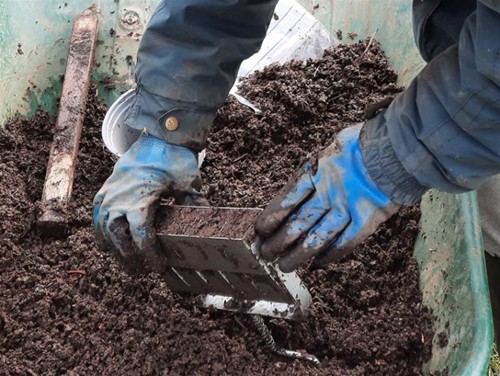



Three growers in Scotland are trying to eliminate the use of peat in the propagation stage of vegetable production. They will use nursery-produced growing media blocks based on “hot bin compost”, soil, leaf mould and other constituents. The growers are keen to "close the loop” in terms of using only locally-available resources in their growing media
It is very difficult to get the textures and physical properties required for producing blocks on any scale without peat. If the group are successful in producing a substrate which has suitable chemical and physical properties, the impact on the sector could be significant, as it would allow commercial growers to produce their own growing media, whilst also eliminating peat from the propagation stage.
This field lab builds on an existing partnership, and a pilot project run by the Forres Area Food Producers and SRUC. It is also receiving funding from The Pebble Trust.
This trial is now complete. The final report and five trial guidance notes can be accessed by clicking the RESULTS AND REPORTS tab on the brown banner above.
Commercially-produced blocking media contain peat. Peat bogs are ecologically sensitive and unique habitats, and peat extraction is known to have detrimental environmental effects,
This project aims to use alternative, more sustainable growing media based on constituents other than peat for propagation. It aims to use only materials sourced from the nurseries themselves or from the immediate local area surrounding them.
By avoiding peat use, this project can contribute to the preservation of these valuable ecosystems.
The trial will be conducted at three sites:
The design is in two stages:
1. Substrate creation:
The three triallists will agree ingredients and mixing ratios for two different recipes each. Feedstocks are likely to include bracken, straw, wool, shredded green/garden waste, leaf mould, molehill soil and animal dung in different ratios.
A “hot-composting” process will be used. Once the compost is stable and ready to be used it will be mixed with other ingredients to create media with suitable chemical and physical properties. Each mixture (two per nursery plus the commercially-available control medium) will be sent to NRM Laboratories for physical and chemical analysis of key parameters.
2. Propagation in growing media blocks
Once the media are ready for use, blocks will be formed using purpose-designed blocking tools, and the blocks will be placed on capillary matting in trays.
The ease with which each medium forms and remains in blocks will be recorded.
There will be three plant species and three growing media types (two nursery-made mixes plus a control). Each block will be seeded with one of the following three species.
Plant performance will be recorded in the different media during germination and plant growth,
Discussion group:
This project will also run a discussion group alongside the trials, involving collaboration among researchers, horticulturalists, and small-scale growers. This interdisciplinary approach will foster knowledge sharing and the development of innovative solutions.
A full trial protocol can be found in the results and reports section of this page.
This successful trial has now concluded. The final report can be found at the RESULTS AND REPORTS section of the brown banner above.
If you are working on peat free blocking yourself do get in contact with the team to share your findings: info@innovativefarmers.org
Audrey Litterick, trial coordinator represented the field lab at the ORFC session on peat free blocking. This year, Innovative Farmers partnered with Riverford to host a session on peat-free horticulture. The discussion explored the future of horticulture and how the industry can make the vital transition away from peat.
Audrey joined the conference via video from Scotland as snow had thwarted her journey down south.
Other speakers included
For more on the session and other IF highlights from ORFC see our news page.
Trial coordinator Audrey Litterick has written the final (of 5) guidance notes to go along with the peat free blocking trial.
This can be found in the reports section of the field lab page (accessed by clicking the tab on the brown banner).
The guidance note focuses on the results of the trial and recommendations for
Audrey Litterick held a webinar for members of the Grow Blocks discussion group, during which she shared initial trial results.
Initial replicated, randomised germination trials were carried out earlier this year in different growing media. These included ten commercial growing media (including eight peat-free and reduced-peat media, one based on extracted peat and one on filtered “recycled” peat and two “own make” media based on 1 year old compost and 3 month old aerobin compost using GrowBlocks recipe.
Results showed that:
• Performance of some commercial media was very poor, with almost no germination after 1 month.
• The best media were not necessarily the most expensive, but some of the cheapest were very poor.

• The two “own-make” media performed acceptably (including the one based on Aerobin compost which was only 3 months old) outperforming a number of the commercial products,
In the first GrowBlocks trial growing media was made to two standard recipes and used alongside a control commercial medium to make “GrowBlocks”
These grow blocks were sown with three different seed species in a randomised, replicated trial on commercial nurseries. The seed germination, seedling performance and plant growth were measured over a period of several weeks.

Relative germination in the four media differed between species. Lettuce grew well in all media, but there were big differences in germination with peas and kale. Kale grew less well in the Tombreck vegan mix, peas grew less well in the Tombreck non-vegan mix. No statistical analysis has been done yet!
They will be testing the growing media for a range of physical, chemical and biological parameters
1. Compost from composting: The controlled, aerobic, biological decomposition of biodegradable materials such as garden and food waste. Achieved through mixing, aeration and self-generated heating, in either open windrows, semi-enclosed or enclosed systems.
2. Compost the growing medium: A (usually bagged) substrate used to sow seeds, pot on young plants or grow plants in.
The two types of compost (true compost and growing media) are totally different and are ABSOLUTELY NOT interchangeable! The trialists are using true compost as an ingredient in their growing medium.
Audrey Litterick, coordinator of the field lab, ran a successful volunteering day with her team at Tombreck in February.

They turned the material in both aerobins and added in some more “high-nitrogen” material. They had a practice with preparing compost for use in growing media and mixed some blocking composts for use in trays to sow seeds in. To their surprise, the very “young” aerobin compost when mixed into media worked very well! Seed germination was better than several proprietary growing media.
It is a fantastic group of willing volunteers, from 6 years old to 65 years old!

At Tombreck, they are now preparing to set up our trial in the next few days. Trials at the other two locations will start in the next few weeks.
The next project meeting (evening, online in May, date to be set soon) will be open to all people who have signed up to the project and they will be doing presentations on various relevant topics.
The growers at the three Field Lab sites have all recently made their first batches of compost in the “Aerobins” and are measuring temperatures in the composting materials.
A short guidance note has been produced which explains a bit about the composting process, introduces the Aerobins™ and explains what feedstock mixtures were used at the three sites.
It can be found in the REPORTS tab of the field lab page
We have released the first Guidance Note which includes a definition of compost.
Please go to the Results and Reports section to download the full guidance note.
Several of the project team met for an initial meeting on Monday 6 November at Pam Rodway’s Wester Lawrenceton Farm, near Forres.

The group discussed results of previous work and priorities for this new project. Ways of communicating within the project group were agreed and logistics of getting four hot bins out to the two other growers’ holdings were sorted out.

Attendees had a look at, and feel of, the hot bin compost which was ready for use and all had a go at mixing growing media from locally-sourced, sieved constituents. One of the experienced block-makers at Wester Lawrenceton then demonstrated how to make grow blocks and everyone present had a chance to practice making blocks for use in propagation.


The next steps for the project were agreed as follows:
October 2023
November 2023
November 2023
March 2024
March / April 2024
May 2024
April - Aug 2024
August 2024
September 2024
October 2024

Earthcare Technical
Scotland
Audrey [BSc (Hons), PhD, MBPR (FACTS, Amenity)] has over 30 years’ experience as a crop and environmental scientist. She has held senior research posts at both Aberdeen University and SAC, where she worked in sustainable and organic crop production, crop nutrition and soil management. During the past 15 years she has specialised in soil assessment, soil management and the use of composts, digestates, fertilisers and other organic materials in agriculture, horticulture, landscaping and land restoration.

Wester Lawrenceton Farm
Moray

East Neuk Market Garden
Fife

SRUC
Scotland